Land Law: Analysis of Co-ownership Case Study - Mephistopheles House
VerifiedAdded on 2020/01/07
|8
|3076
|279
Case Study
AI Summary
This case study examines the complexities of land law, specifically focusing on co-ownership and the distinction between legal estates and equitable interests. The scenario involves five individuals—Ian, Geoffrey, Ursula, Venus, and Adam—who jointly own a property, the Mephistopheles House, under a tenancy in common arrangement. The analysis explores how various events, such as Ian's intention to sell his share, Ursula's death and subsequent transfer of her share to Geoffrey, and Geoffrey's bankruptcy and death, impact the ownership structure. The case study highlights the importance of valid notice of severance, the right of survivorship, and the implications of insolvency on property rights. It references key legal principles and cases, including Goodman v. Gallant, Stack v. Dowden, and Jones v. Kernott, to illustrate the legal framework governing co-ownership and the rights of the involved parties. The case study also addresses the conveyancing process Daniel must be aware of if he wishes to purchase the property from Adam and the need for all owners' agreement for sale.

LAND LAW
Paraphrase This Document
Need a fresh take? Get an instant paraphrase of this document with our AI Paraphraser
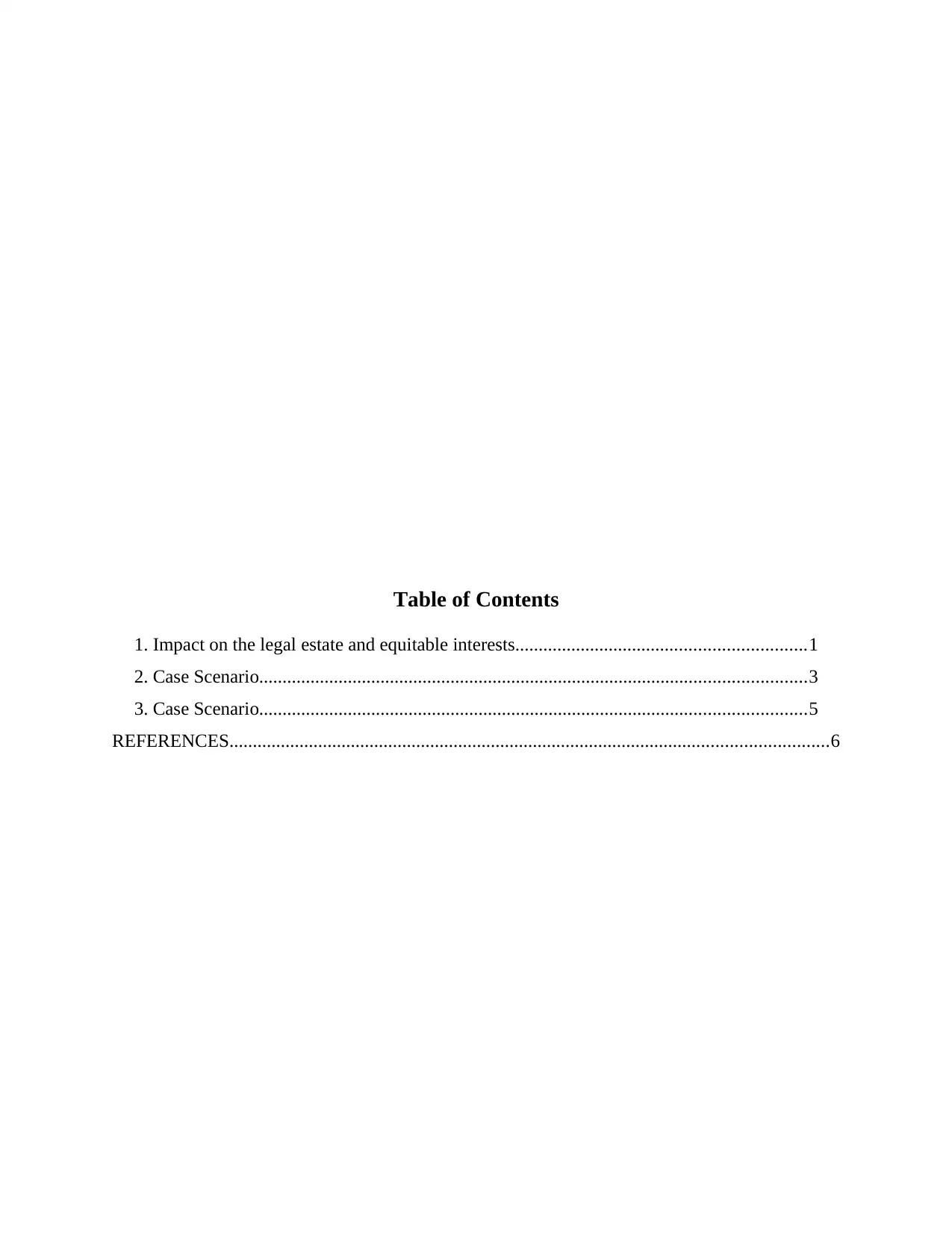
Table of Contents
1. Impact on the legal estate and equitable interests..............................................................1
2. Case Scenario.....................................................................................................................3
3. Case Scenario.....................................................................................................................5
REFERENCES................................................................................................................................6
1. Impact on the legal estate and equitable interests..............................................................1
2. Case Scenario.....................................................................................................................3
3. Case Scenario.....................................................................................................................5
REFERENCES................................................................................................................................6
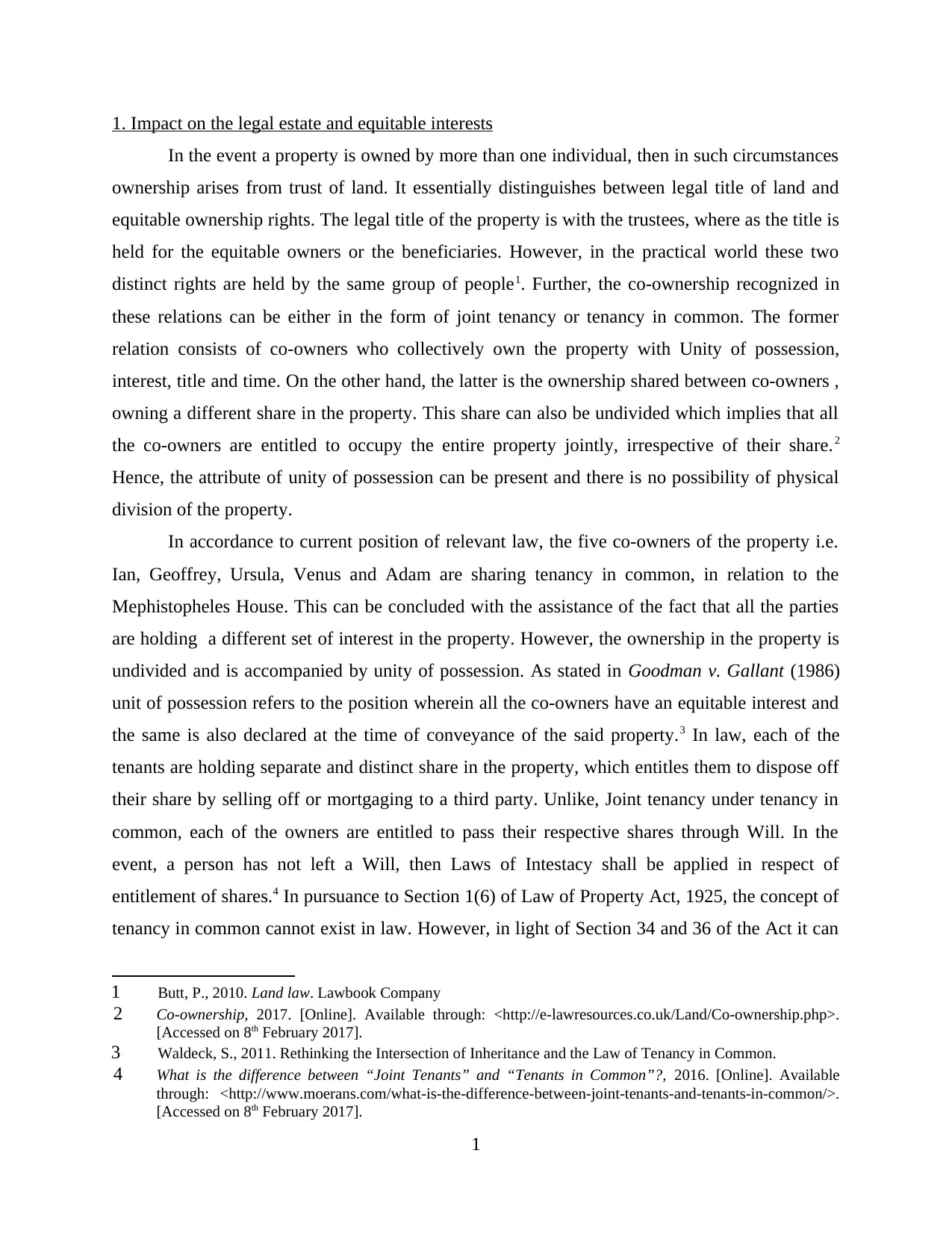
1. Impact on the legal estate and equitable interests
In the event a property is owned by more than one individual, then in such circumstances
ownership arises from trust of land. It essentially distinguishes between legal title of land and
equitable ownership rights. The legal title of the property is with the trustees, where as the title is
held for the equitable owners or the beneficiaries. However, in the practical world these two
distinct rights are held by the same group of people1. Further, the co-ownership recognized in
these relations can be either in the form of joint tenancy or tenancy in common. The former
relation consists of co-owners who collectively own the property with Unity of possession,
interest, title and time. On the other hand, the latter is the ownership shared between co-owners ,
owning a different share in the property. This share can also be undivided which implies that all
the co-owners are entitled to occupy the entire property jointly, irrespective of their share.2
Hence, the attribute of unity of possession can be present and there is no possibility of physical
division of the property.
In accordance to current position of relevant law, the five co-owners of the property i.e.
Ian, Geoffrey, Ursula, Venus and Adam are sharing tenancy in common, in relation to the
Mephistopheles House. This can be concluded with the assistance of the fact that all the parties
are holding a different set of interest in the property. However, the ownership in the property is
undivided and is accompanied by unity of possession. As stated in Goodman v. Gallant (1986)
unit of possession refers to the position wherein all the co-owners have an equitable interest and
the same is also declared at the time of conveyance of the said property.3 In law, each of the
tenants are holding separate and distinct share in the property, which entitles them to dispose off
their share by selling off or mortgaging to a third party. Unlike, Joint tenancy under tenancy in
common, each of the owners are entitled to pass their respective shares through Will. In the
event, a person has not left a Will, then Laws of Intestacy shall be applied in respect of
entitlement of shares.4 In pursuance to Section 1(6) of Law of Property Act, 1925, the concept of
tenancy in common cannot exist in law. However, in light of Section 34 and 36 of the Act it can
1 Butt, P., 2010. Land law. Lawbook Company
2 Co-ownership, 2017. [Online]. Available through: <http://e-lawresources.co.uk/Land/Co-ownership.php>.
[Accessed on 8th February 2017].
3 Waldeck, S., 2011. Rethinking the Intersection of Inheritance and the Law of Tenancy in Common.
4 What is the difference between “Joint Tenants” and “Tenants in Common”?, 2016. [Online]. Available
through: <http://www.moerans.com/what-is-the-difference-between-joint-tenants-and-tenants-in-common/>.
[Accessed on 8th February 2017].
1
In the event a property is owned by more than one individual, then in such circumstances
ownership arises from trust of land. It essentially distinguishes between legal title of land and
equitable ownership rights. The legal title of the property is with the trustees, where as the title is
held for the equitable owners or the beneficiaries. However, in the practical world these two
distinct rights are held by the same group of people1. Further, the co-ownership recognized in
these relations can be either in the form of joint tenancy or tenancy in common. The former
relation consists of co-owners who collectively own the property with Unity of possession,
interest, title and time. On the other hand, the latter is the ownership shared between co-owners ,
owning a different share in the property. This share can also be undivided which implies that all
the co-owners are entitled to occupy the entire property jointly, irrespective of their share.2
Hence, the attribute of unity of possession can be present and there is no possibility of physical
division of the property.
In accordance to current position of relevant law, the five co-owners of the property i.e.
Ian, Geoffrey, Ursula, Venus and Adam are sharing tenancy in common, in relation to the
Mephistopheles House. This can be concluded with the assistance of the fact that all the parties
are holding a different set of interest in the property. However, the ownership in the property is
undivided and is accompanied by unity of possession. As stated in Goodman v. Gallant (1986)
unit of possession refers to the position wherein all the co-owners have an equitable interest and
the same is also declared at the time of conveyance of the said property.3 In law, each of the
tenants are holding separate and distinct share in the property, which entitles them to dispose off
their share by selling off or mortgaging to a third party. Unlike, Joint tenancy under tenancy in
common, each of the owners are entitled to pass their respective shares through Will. In the
event, a person has not left a Will, then Laws of Intestacy shall be applied in respect of
entitlement of shares.4 In pursuance to Section 1(6) of Law of Property Act, 1925, the concept of
tenancy in common cannot exist in law. However, in light of Section 34 and 36 of the Act it can
1 Butt, P., 2010. Land law. Lawbook Company
2 Co-ownership, 2017. [Online]. Available through: <http://e-lawresources.co.uk/Land/Co-ownership.php>.
[Accessed on 8th February 2017].
3 Waldeck, S., 2011. Rethinking the Intersection of Inheritance and the Law of Tenancy in Common.
4 What is the difference between “Joint Tenants” and “Tenants in Common”?, 2016. [Online]. Available
through: <http://www.moerans.com/what-is-the-difference-between-joint-tenants-and-tenants-in-common/>.
[Accessed on 8th February 2017].
1
⊘ This is a preview!⊘
Do you want full access?
Subscribe today to unlock all pages.

Trusted by 1+ million students worldwide
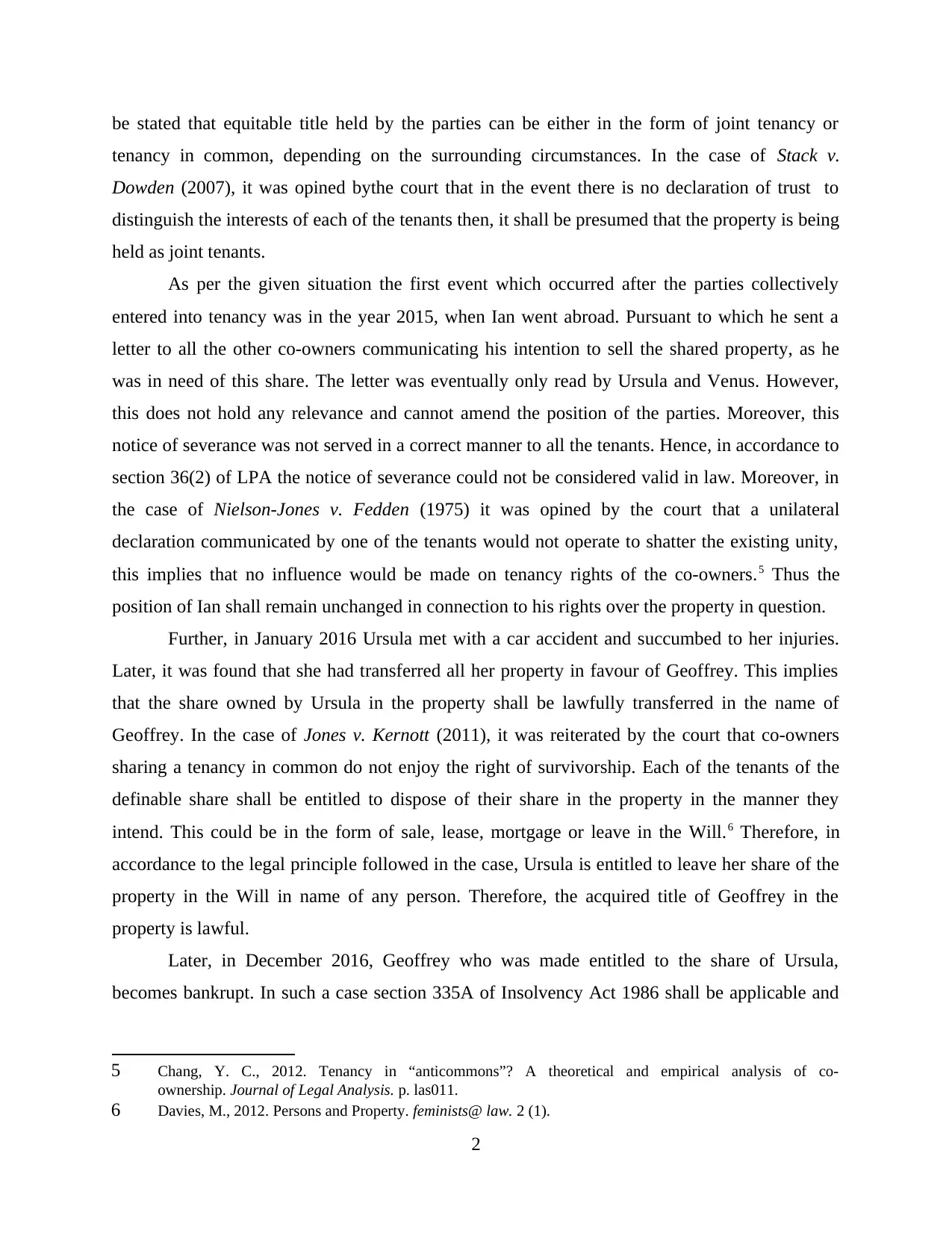
be stated that equitable title held by the parties can be either in the form of joint tenancy or
tenancy in common, depending on the surrounding circumstances. In the case of Stack v.
Dowden (2007), it was opined bythe court that in the event there is no declaration of trust to
distinguish the interests of each of the tenants then, it shall be presumed that the property is being
held as joint tenants.
As per the given situation the first event which occurred after the parties collectively
entered into tenancy was in the year 2015, when Ian went abroad. Pursuant to which he sent a
letter to all the other co-owners communicating his intention to sell the shared property, as he
was in need of this share. The letter was eventually only read by Ursula and Venus. However,
this does not hold any relevance and cannot amend the position of the parties. Moreover, this
notice of severance was not served in a correct manner to all the tenants. Hence, in accordance to
section 36(2) of LPA the notice of severance could not be considered valid in law. Moreover, in
the case of Nielson-Jones v. Fedden (1975) it was opined by the court that a unilateral
declaration communicated by one of the tenants would not operate to shatter the existing unity,
this implies that no influence would be made on tenancy rights of the co-owners.5 Thus the
position of Ian shall remain unchanged in connection to his rights over the property in question.
Further, in January 2016 Ursula met with a car accident and succumbed to her injuries.
Later, it was found that she had transferred all her property in favour of Geoffrey. This implies
that the share owned by Ursula in the property shall be lawfully transferred in the name of
Geoffrey. In the case of Jones v. Kernott (2011), it was reiterated by the court that co-owners
sharing a tenancy in common do not enjoy the right of survivorship. Each of the tenants of the
definable share shall be entitled to dispose of their share in the property in the manner they
intend. This could be in the form of sale, lease, mortgage or leave in the Will.6 Therefore, in
accordance to the legal principle followed in the case, Ursula is entitled to leave her share of the
property in the Will in name of any person. Therefore, the acquired title of Geoffrey in the
property is lawful.
Later, in December 2016, Geoffrey who was made entitled to the share of Ursula,
becomes bankrupt. In such a case section 335A of Insolvency Act 1986 shall be applicable and
5 Chang, Y. C., 2012. Tenancy in “anticommons”? A theoretical and empirical analysis of co-
ownership. Journal of Legal Analysis. p. las011.
6 Davies, M., 2012. Persons and Property. feminists@ law. 2 (1).
2
tenancy in common, depending on the surrounding circumstances. In the case of Stack v.
Dowden (2007), it was opined bythe court that in the event there is no declaration of trust to
distinguish the interests of each of the tenants then, it shall be presumed that the property is being
held as joint tenants.
As per the given situation the first event which occurred after the parties collectively
entered into tenancy was in the year 2015, when Ian went abroad. Pursuant to which he sent a
letter to all the other co-owners communicating his intention to sell the shared property, as he
was in need of this share. The letter was eventually only read by Ursula and Venus. However,
this does not hold any relevance and cannot amend the position of the parties. Moreover, this
notice of severance was not served in a correct manner to all the tenants. Hence, in accordance to
section 36(2) of LPA the notice of severance could not be considered valid in law. Moreover, in
the case of Nielson-Jones v. Fedden (1975) it was opined by the court that a unilateral
declaration communicated by one of the tenants would not operate to shatter the existing unity,
this implies that no influence would be made on tenancy rights of the co-owners.5 Thus the
position of Ian shall remain unchanged in connection to his rights over the property in question.
Further, in January 2016 Ursula met with a car accident and succumbed to her injuries.
Later, it was found that she had transferred all her property in favour of Geoffrey. This implies
that the share owned by Ursula in the property shall be lawfully transferred in the name of
Geoffrey. In the case of Jones v. Kernott (2011), it was reiterated by the court that co-owners
sharing a tenancy in common do not enjoy the right of survivorship. Each of the tenants of the
definable share shall be entitled to dispose of their share in the property in the manner they
intend. This could be in the form of sale, lease, mortgage or leave in the Will.6 Therefore, in
accordance to the legal principle followed in the case, Ursula is entitled to leave her share of the
property in the Will in name of any person. Therefore, the acquired title of Geoffrey in the
property is lawful.
Later, in December 2016, Geoffrey who was made entitled to the share of Ursula,
becomes bankrupt. In such a case section 335A of Insolvency Act 1986 shall be applicable and
5 Chang, Y. C., 2012. Tenancy in “anticommons”? A theoretical and empirical analysis of co-
ownership. Journal of Legal Analysis. p. las011.
6 Davies, M., 2012. Persons and Property. feminists@ law. 2 (1).
2
Paraphrase This Document
Need a fresh take? Get an instant paraphrase of this document with our AI Paraphraser
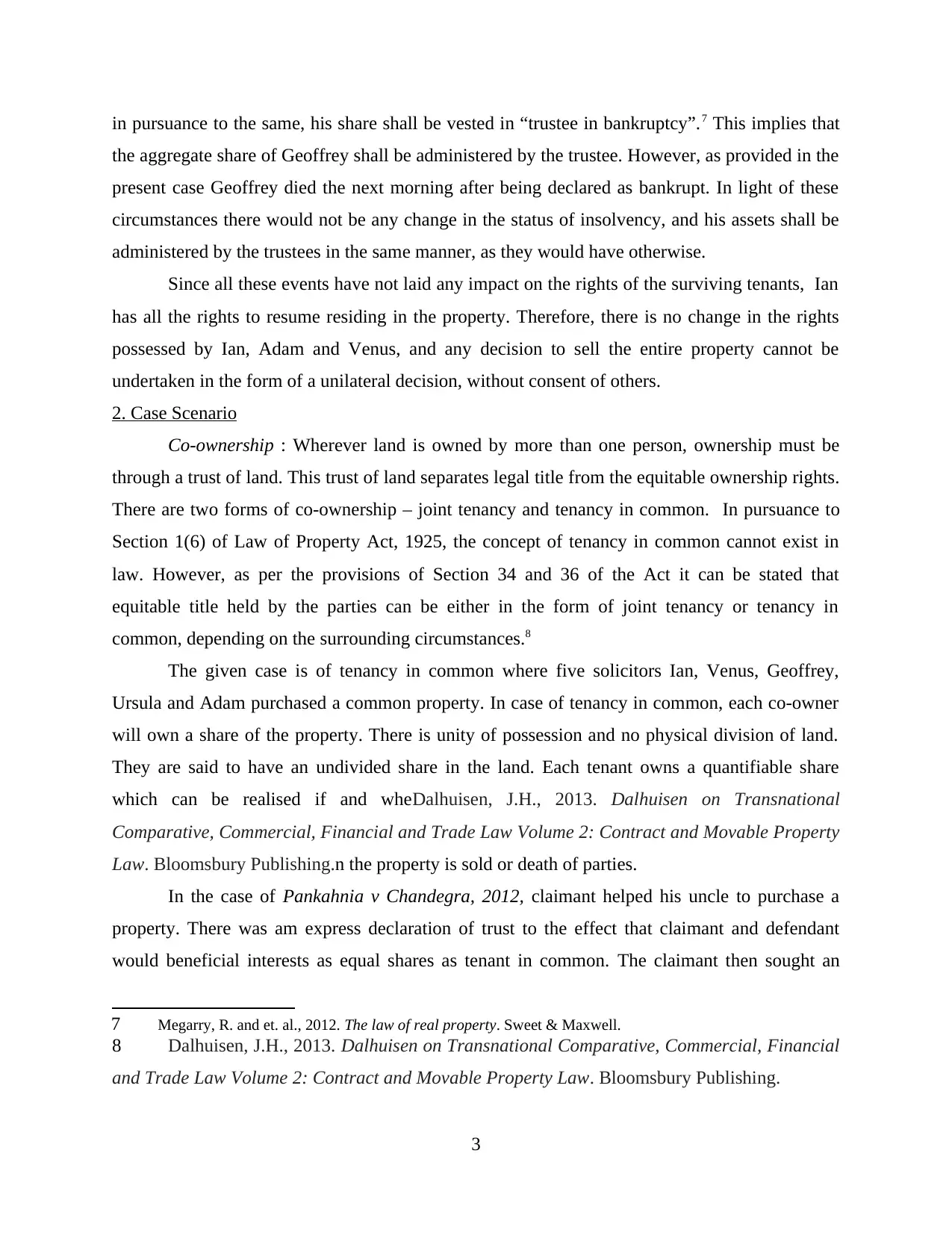
in pursuance to the same, his share shall be vested in “trustee in bankruptcy”.7 This implies that
the aggregate share of Geoffrey shall be administered by the trustee. However, as provided in the
present case Geoffrey died the next morning after being declared as bankrupt. In light of these
circumstances there would not be any change in the status of insolvency, and his assets shall be
administered by the trustees in the same manner, as they would have otherwise.
Since all these events have not laid any impact on the rights of the surviving tenants, Ian
has all the rights to resume residing in the property. Therefore, there is no change in the rights
possessed by Ian, Adam and Venus, and any decision to sell the entire property cannot be
undertaken in the form of a unilateral decision, without consent of others.
2. Case Scenario
Co-ownership : Wherever land is owned by more than one person, ownership must be
through a trust of land. This trust of land separates legal title from the equitable ownership rights.
There are two forms of co-ownership – joint tenancy and tenancy in common. In pursuance to
Section 1(6) of Law of Property Act, 1925, the concept of tenancy in common cannot exist in
law. However, as per the provisions of Section 34 and 36 of the Act it can be stated that
equitable title held by the parties can be either in the form of joint tenancy or tenancy in
common, depending on the surrounding circumstances.8
The given case is of tenancy in common where five solicitors Ian, Venus, Geoffrey,
Ursula and Adam purchased a common property. In case of tenancy in common, each co-owner
will own a share of the property. There is unity of possession and no physical division of land.
They are said to have an undivided share in the land. Each tenant owns a quantifiable share
which can be realised if and wheDalhuisen, J.H., 2013. Dalhuisen on Transnational
Comparative, Commercial, Financial and Trade Law Volume 2: Contract and Movable Property
Law. Bloomsbury Publishing.n the property is sold or death of parties.
In the case of Pankahnia v Chandegra, 2012, claimant helped his uncle to purchase a
property. There was am express declaration of trust to the effect that claimant and defendant
would beneficial interests as equal shares as tenant in common. The claimant then sought an
7 Megarry, R. and et. al., 2012. The law of real property. Sweet & Maxwell.
8 Dalhuisen, J.H., 2013. Dalhuisen on Transnational Comparative, Commercial, Financial
and Trade Law Volume 2: Contract and Movable Property Law. Bloomsbury Publishing.
3
the aggregate share of Geoffrey shall be administered by the trustee. However, as provided in the
present case Geoffrey died the next morning after being declared as bankrupt. In light of these
circumstances there would not be any change in the status of insolvency, and his assets shall be
administered by the trustees in the same manner, as they would have otherwise.
Since all these events have not laid any impact on the rights of the surviving tenants, Ian
has all the rights to resume residing in the property. Therefore, there is no change in the rights
possessed by Ian, Adam and Venus, and any decision to sell the entire property cannot be
undertaken in the form of a unilateral decision, without consent of others.
2. Case Scenario
Co-ownership : Wherever land is owned by more than one person, ownership must be
through a trust of land. This trust of land separates legal title from the equitable ownership rights.
There are two forms of co-ownership – joint tenancy and tenancy in common. In pursuance to
Section 1(6) of Law of Property Act, 1925, the concept of tenancy in common cannot exist in
law. However, as per the provisions of Section 34 and 36 of the Act it can be stated that
equitable title held by the parties can be either in the form of joint tenancy or tenancy in
common, depending on the surrounding circumstances.8
The given case is of tenancy in common where five solicitors Ian, Venus, Geoffrey,
Ursula and Adam purchased a common property. In case of tenancy in common, each co-owner
will own a share of the property. There is unity of possession and no physical division of land.
They are said to have an undivided share in the land. Each tenant owns a quantifiable share
which can be realised if and wheDalhuisen, J.H., 2013. Dalhuisen on Transnational
Comparative, Commercial, Financial and Trade Law Volume 2: Contract and Movable Property
Law. Bloomsbury Publishing.n the property is sold or death of parties.
In the case of Pankahnia v Chandegra, 2012, claimant helped his uncle to purchase a
property. There was am express declaration of trust to the effect that claimant and defendant
would beneficial interests as equal shares as tenant in common. The claimant then sought an
7 Megarry, R. and et. al., 2012. The law of real property. Sweet & Maxwell.
8 Dalhuisen, J.H., 2013. Dalhuisen on Transnational Comparative, Commercial, Financial
and Trade Law Volume 2: Contract and Movable Property Law. Bloomsbury Publishing.
3
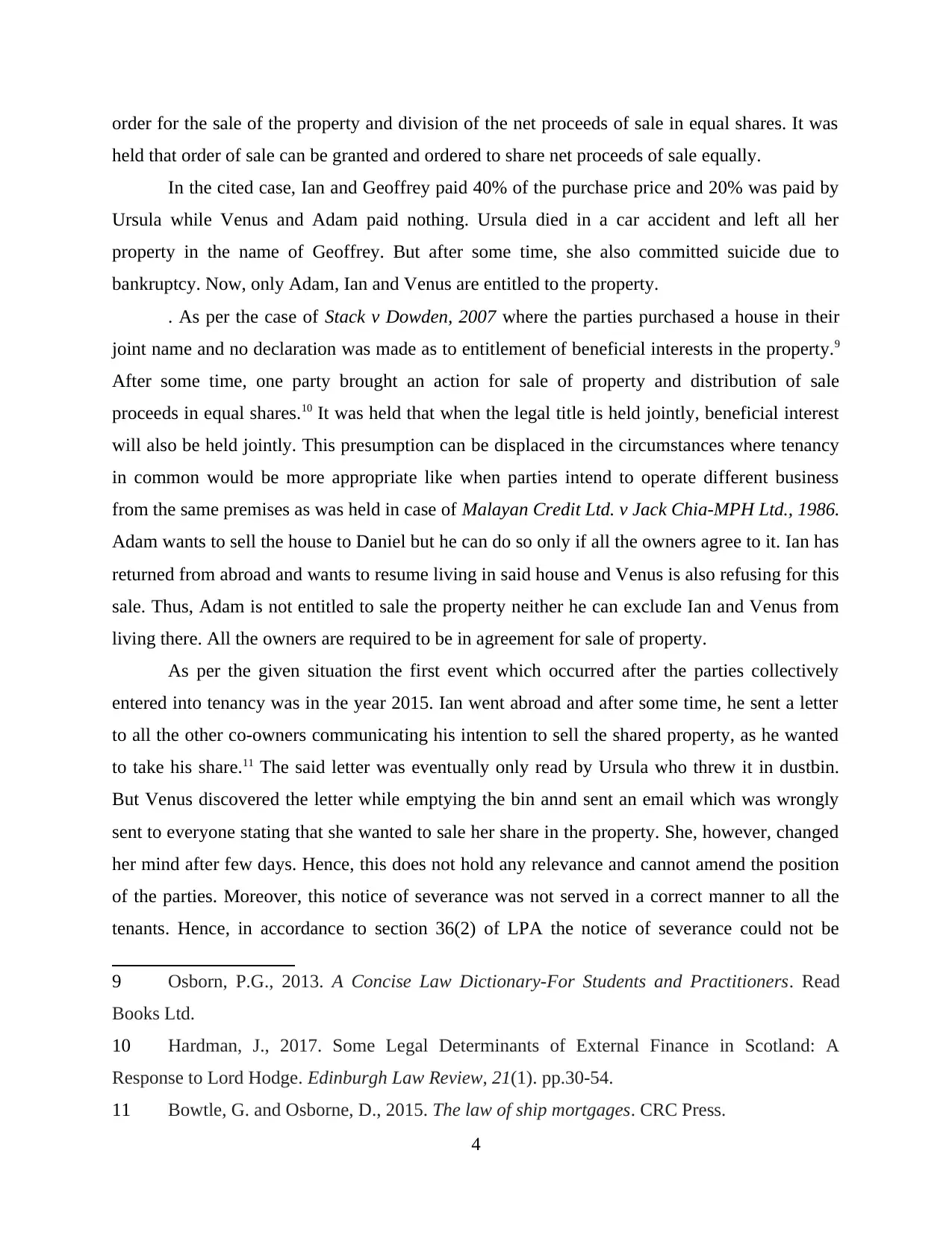
order for the sale of the property and division of the net proceeds of sale in equal shares. It was
held that order of sale can be granted and ordered to share net proceeds of sale equally.
In the cited case, Ian and Geoffrey paid 40% of the purchase price and 20% was paid by
Ursula while Venus and Adam paid nothing. Ursula died in a car accident and left all her
property in the name of Geoffrey. But after some time, she also committed suicide due to
bankruptcy. Now, only Adam, Ian and Venus are entitled to the property.
. As per the case of Stack v Dowden, 2007 where the parties purchased a house in their
joint name and no declaration was made as to entitlement of beneficial interests in the property.9
After some time, one party brought an action for sale of property and distribution of sale
proceeds in equal shares.10 It was held that when the legal title is held jointly, beneficial interest
will also be held jointly. This presumption can be displaced in the circumstances where tenancy
in common would be more appropriate like when parties intend to operate different business
from the same premises as was held in case of Malayan Credit Ltd. v Jack Chia-MPH Ltd., 1986.
Adam wants to sell the house to Daniel but he can do so only if all the owners agree to it. Ian has
returned from abroad and wants to resume living in said house and Venus is also refusing for this
sale. Thus, Adam is not entitled to sale the property neither he can exclude Ian and Venus from
living there. All the owners are required to be in agreement for sale of property.
As per the given situation the first event which occurred after the parties collectively
entered into tenancy was in the year 2015. Ian went abroad and after some time, he sent a letter
to all the other co-owners communicating his intention to sell the shared property, as he wanted
to take his share.11 The said letter was eventually only read by Ursula who threw it in dustbin.
But Venus discovered the letter while emptying the bin annd sent an email which was wrongly
sent to everyone stating that she wanted to sale her share in the property. She, however, changed
her mind after few days. Hence, this does not hold any relevance and cannot amend the position
of the parties. Moreover, this notice of severance was not served in a correct manner to all the
tenants. Hence, in accordance to section 36(2) of LPA the notice of severance could not be
9 Osborn, P.G., 2013. A Concise Law Dictionary-For Students and Practitioners. Read
Books Ltd.
10 Hardman, J., 2017. Some Legal Determinants of External Finance in Scotland: A
Response to Lord Hodge. Edinburgh Law Review, 21(1). pp.30-54.
11 Bowtle, G. and Osborne, D., 2015. The law of ship mortgages. CRC Press.
4
held that order of sale can be granted and ordered to share net proceeds of sale equally.
In the cited case, Ian and Geoffrey paid 40% of the purchase price and 20% was paid by
Ursula while Venus and Adam paid nothing. Ursula died in a car accident and left all her
property in the name of Geoffrey. But after some time, she also committed suicide due to
bankruptcy. Now, only Adam, Ian and Venus are entitled to the property.
. As per the case of Stack v Dowden, 2007 where the parties purchased a house in their
joint name and no declaration was made as to entitlement of beneficial interests in the property.9
After some time, one party brought an action for sale of property and distribution of sale
proceeds in equal shares.10 It was held that when the legal title is held jointly, beneficial interest
will also be held jointly. This presumption can be displaced in the circumstances where tenancy
in common would be more appropriate like when parties intend to operate different business
from the same premises as was held in case of Malayan Credit Ltd. v Jack Chia-MPH Ltd., 1986.
Adam wants to sell the house to Daniel but he can do so only if all the owners agree to it. Ian has
returned from abroad and wants to resume living in said house and Venus is also refusing for this
sale. Thus, Adam is not entitled to sale the property neither he can exclude Ian and Venus from
living there. All the owners are required to be in agreement for sale of property.
As per the given situation the first event which occurred after the parties collectively
entered into tenancy was in the year 2015. Ian went abroad and after some time, he sent a letter
to all the other co-owners communicating his intention to sell the shared property, as he wanted
to take his share.11 The said letter was eventually only read by Ursula who threw it in dustbin.
But Venus discovered the letter while emptying the bin annd sent an email which was wrongly
sent to everyone stating that she wanted to sale her share in the property. She, however, changed
her mind after few days. Hence, this does not hold any relevance and cannot amend the position
of the parties. Moreover, this notice of severance was not served in a correct manner to all the
tenants. Hence, in accordance to section 36(2) of LPA the notice of severance could not be
9 Osborn, P.G., 2013. A Concise Law Dictionary-For Students and Practitioners. Read
Books Ltd.
10 Hardman, J., 2017. Some Legal Determinants of External Finance in Scotland: A
Response to Lord Hodge. Edinburgh Law Review, 21(1). pp.30-54.
11 Bowtle, G. and Osborne, D., 2015. The law of ship mortgages. CRC Press.
4
⊘ This is a preview!⊘
Do you want full access?
Subscribe today to unlock all pages.

Trusted by 1+ million students worldwide
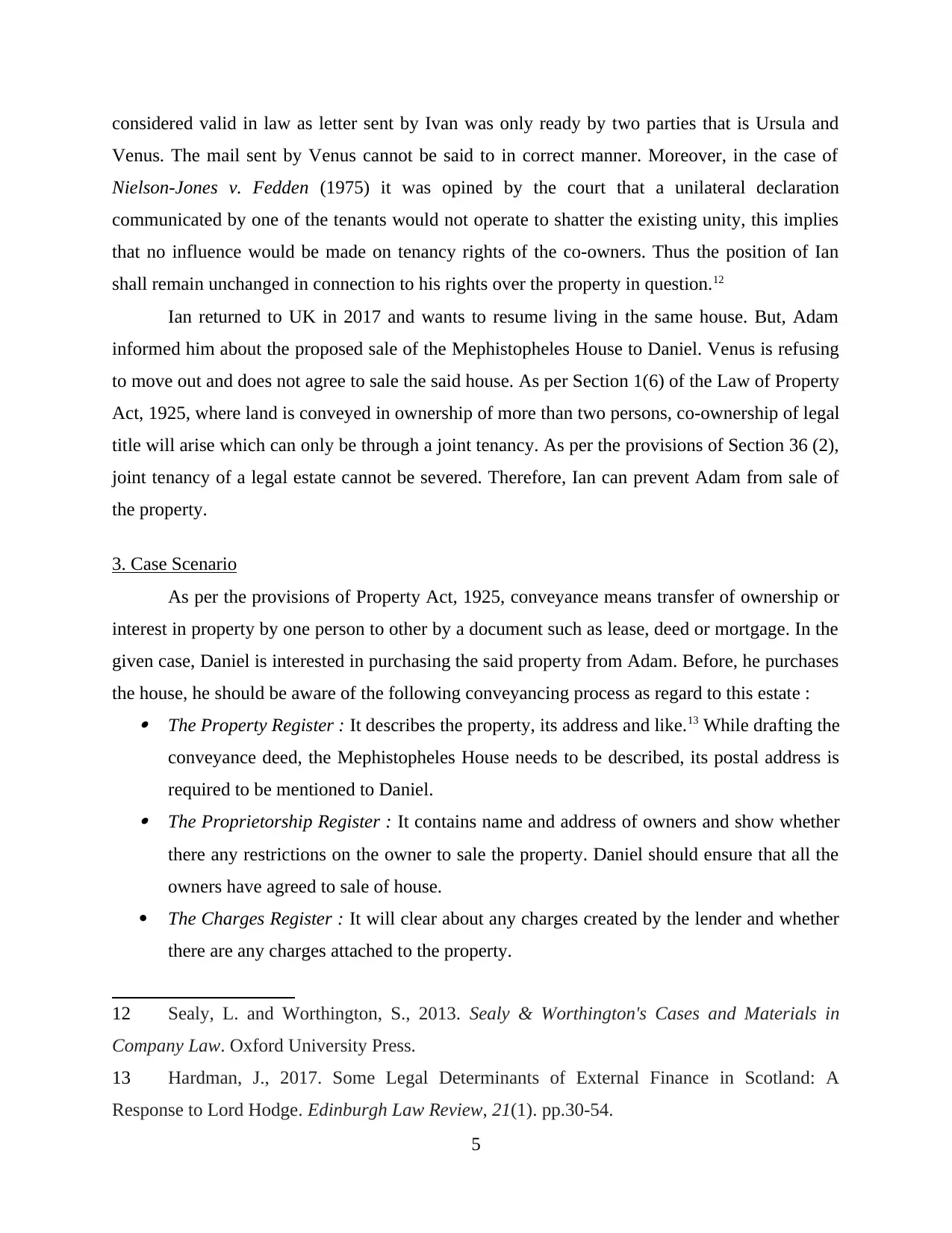
considered valid in law as letter sent by Ivan was only ready by two parties that is Ursula and
Venus. The mail sent by Venus cannot be said to in correct manner. Moreover, in the case of
Nielson-Jones v. Fedden (1975) it was opined by the court that a unilateral declaration
communicated by one of the tenants would not operate to shatter the existing unity, this implies
that no influence would be made on tenancy rights of the co-owners. Thus the position of Ian
shall remain unchanged in connection to his rights over the property in question.12
Ian returned to UK in 2017 and wants to resume living in the same house. But, Adam
informed him about the proposed sale of the Mephistopheles House to Daniel. Venus is refusing
to move out and does not agree to sale the said house. As per Section 1(6) of the Law of Property
Act, 1925, where land is conveyed in ownership of more than two persons, co-ownership of legal
title will arise which can only be through a joint tenancy. As per the provisions of Section 36 (2),
joint tenancy of a legal estate cannot be severed. Therefore, Ian can prevent Adam from sale of
the property.
3. Case Scenario
As per the provisions of Property Act, 1925, conveyance means transfer of ownership or
interest in property by one person to other by a document such as lease, deed or mortgage. In the
given case, Daniel is interested in purchasing the said property from Adam. Before, he purchases
the house, he should be aware of the following conveyancing process as regard to this estate : The Property Register : It describes the property, its address and like.13 While drafting the
conveyance deed, the Mephistopheles House needs to be described, its postal address is
required to be mentioned to Daniel. The Proprietorship Register : It contains name and address of owners and show whether
there any restrictions on the owner to sale the property. Daniel should ensure that all the
owners have agreed to sale of house.
The Charges Register : It will clear about any charges created by the lender and whether
there are any charges attached to the property.
12 Sealy, L. and Worthington, S., 2013. Sealy & Worthington's Cases and Materials in
Company Law. Oxford University Press.
13 Hardman, J., 2017. Some Legal Determinants of External Finance in Scotland: A
Response to Lord Hodge. Edinburgh Law Review, 21(1). pp.30-54.
5
Venus. The mail sent by Venus cannot be said to in correct manner. Moreover, in the case of
Nielson-Jones v. Fedden (1975) it was opined by the court that a unilateral declaration
communicated by one of the tenants would not operate to shatter the existing unity, this implies
that no influence would be made on tenancy rights of the co-owners. Thus the position of Ian
shall remain unchanged in connection to his rights over the property in question.12
Ian returned to UK in 2017 and wants to resume living in the same house. But, Adam
informed him about the proposed sale of the Mephistopheles House to Daniel. Venus is refusing
to move out and does not agree to sale the said house. As per Section 1(6) of the Law of Property
Act, 1925, where land is conveyed in ownership of more than two persons, co-ownership of legal
title will arise which can only be through a joint tenancy. As per the provisions of Section 36 (2),
joint tenancy of a legal estate cannot be severed. Therefore, Ian can prevent Adam from sale of
the property.
3. Case Scenario
As per the provisions of Property Act, 1925, conveyance means transfer of ownership or
interest in property by one person to other by a document such as lease, deed or mortgage. In the
given case, Daniel is interested in purchasing the said property from Adam. Before, he purchases
the house, he should be aware of the following conveyancing process as regard to this estate : The Property Register : It describes the property, its address and like.13 While drafting the
conveyance deed, the Mephistopheles House needs to be described, its postal address is
required to be mentioned to Daniel. The Proprietorship Register : It contains name and address of owners and show whether
there any restrictions on the owner to sale the property. Daniel should ensure that all the
owners have agreed to sale of house.
The Charges Register : It will clear about any charges created by the lender and whether
there are any charges attached to the property.
12 Sealy, L. and Worthington, S., 2013. Sealy & Worthington's Cases and Materials in
Company Law. Oxford University Press.
13 Hardman, J., 2017. Some Legal Determinants of External Finance in Scotland: A
Response to Lord Hodge. Edinburgh Law Review, 21(1). pp.30-54.
5
Paraphrase This Document
Need a fresh take? Get an instant paraphrase of this document with our AI Paraphraser
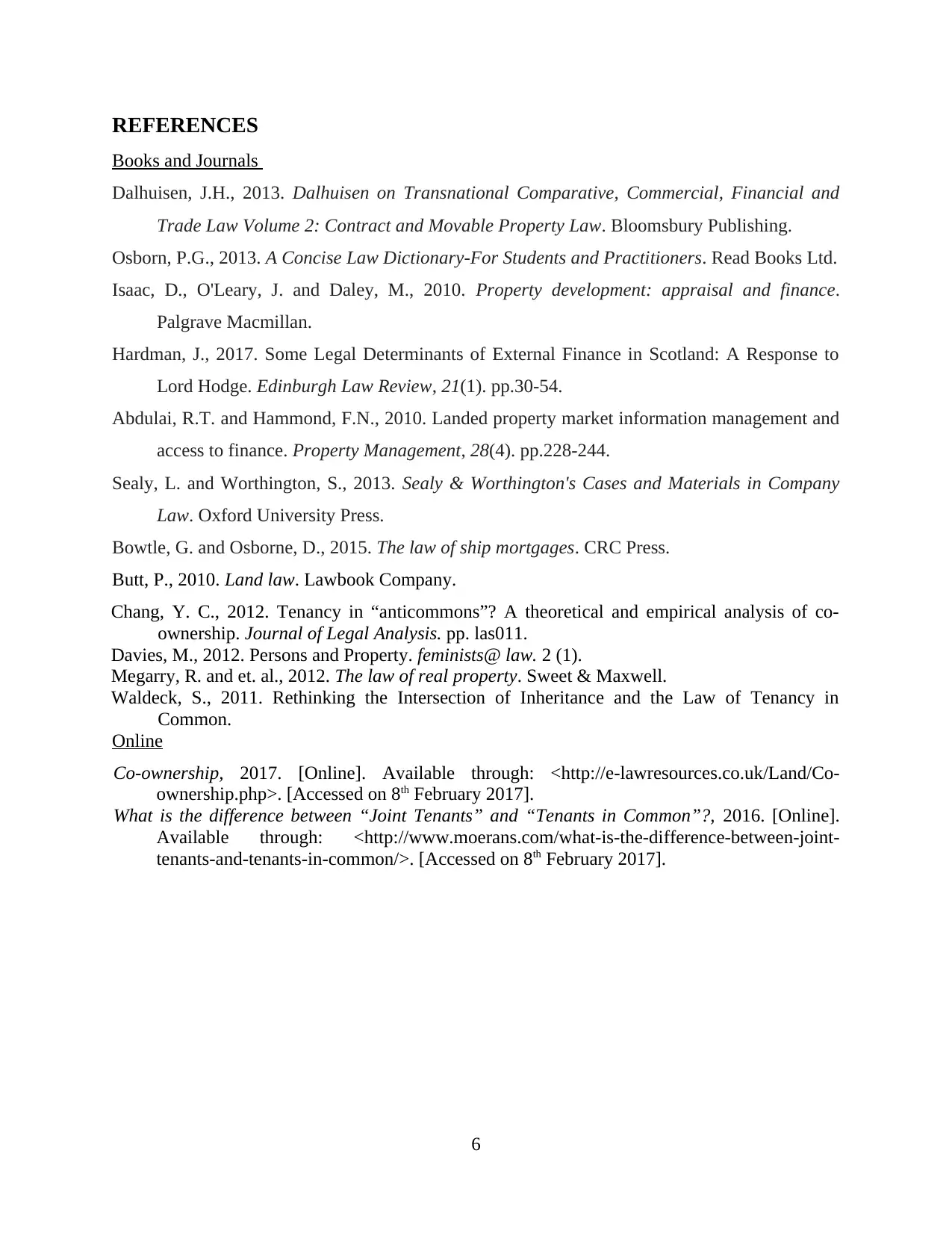
REFERENCES
Books and Journals
Dalhuisen, J.H., 2013. Dalhuisen on Transnational Comparative, Commercial, Financial and
Trade Law Volume 2: Contract and Movable Property Law. Bloomsbury Publishing.
Osborn, P.G., 2013. A Concise Law Dictionary-For Students and Practitioners. Read Books Ltd.
Isaac, D., O'Leary, J. and Daley, M., 2010. Property development: appraisal and finance.
Palgrave Macmillan.
Hardman, J., 2017. Some Legal Determinants of External Finance in Scotland: A Response to
Lord Hodge. Edinburgh Law Review, 21(1). pp.30-54.
Abdulai, R.T. and Hammond, F.N., 2010. Landed property market information management and
access to finance. Property Management, 28(4). pp.228-244.
Sealy, L. and Worthington, S., 2013. Sealy & Worthington's Cases and Materials in Company
Law. Oxford University Press.
Bowtle, G. and Osborne, D., 2015. The law of ship mortgages. CRC Press.
Butt, P., 2010. Land law. Lawbook Company.
Chang, Y. C., 2012. Tenancy in “anticommons”? A theoretical and empirical analysis of co-
ownership. Journal of Legal Analysis. pp. las011.
Davies, M., 2012. Persons and Property. feminists@ law. 2 (1).
Megarry, R. and et. al., 2012. The law of real property. Sweet & Maxwell.
Waldeck, S., 2011. Rethinking the Intersection of Inheritance and the Law of Tenancy in
Common.
Online
Co-ownership, 2017. [Online]. Available through: <http://e-lawresources.co.uk/Land/Co-
ownership.php>. [Accessed on 8th February 2017].
What is the difference between “Joint Tenants” and “Tenants in Common”?, 2016. [Online].
Available through: <http://www.moerans.com/what-is-the-difference-between-joint-
tenants-and-tenants-in-common/>. [Accessed on 8th February 2017].
6
Books and Journals
Dalhuisen, J.H., 2013. Dalhuisen on Transnational Comparative, Commercial, Financial and
Trade Law Volume 2: Contract and Movable Property Law. Bloomsbury Publishing.
Osborn, P.G., 2013. A Concise Law Dictionary-For Students and Practitioners. Read Books Ltd.
Isaac, D., O'Leary, J. and Daley, M., 2010. Property development: appraisal and finance.
Palgrave Macmillan.
Hardman, J., 2017. Some Legal Determinants of External Finance in Scotland: A Response to
Lord Hodge. Edinburgh Law Review, 21(1). pp.30-54.
Abdulai, R.T. and Hammond, F.N., 2010. Landed property market information management and
access to finance. Property Management, 28(4). pp.228-244.
Sealy, L. and Worthington, S., 2013. Sealy & Worthington's Cases and Materials in Company
Law. Oxford University Press.
Bowtle, G. and Osborne, D., 2015. The law of ship mortgages. CRC Press.
Butt, P., 2010. Land law. Lawbook Company.
Chang, Y. C., 2012. Tenancy in “anticommons”? A theoretical and empirical analysis of co-
ownership. Journal of Legal Analysis. pp. las011.
Davies, M., 2012. Persons and Property. feminists@ law. 2 (1).
Megarry, R. and et. al., 2012. The law of real property. Sweet & Maxwell.
Waldeck, S., 2011. Rethinking the Intersection of Inheritance and the Law of Tenancy in
Common.
Online
Co-ownership, 2017. [Online]. Available through: <http://e-lawresources.co.uk/Land/Co-
ownership.php>. [Accessed on 8th February 2017].
What is the difference between “Joint Tenants” and “Tenants in Common”?, 2016. [Online].
Available through: <http://www.moerans.com/what-is-the-difference-between-joint-
tenants-and-tenants-in-common/>. [Accessed on 8th February 2017].
6
1 out of 8
Related Documents
Your All-in-One AI-Powered Toolkit for Academic Success.
+13062052269
info@desklib.com
Available 24*7 on WhatsApp / Email
![[object Object]](/_next/static/media/star-bottom.7253800d.svg)
Unlock your academic potential
Copyright © 2020–2026 A2Z Services. All Rights Reserved. Developed and managed by ZUCOL.





